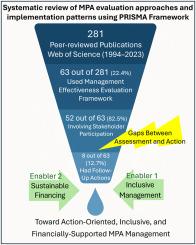弥合海洋保护区从管理评估到改善行动的保育实施差距
IF 5.4
2区 环境科学与生态学
Q1 OCEANOGRAPHY
引用次数: 0
摘要
海洋保护区(MPAs)是重要的保护工具,但在管理评估框架的有效性及其转化为可操作成果方面存在重大知识空白。本系统综述分析了281篇同行评议的出版物(1994-2023),以检验MPA管理有效性评估(MEE)方法。只有63项研究(22.4%)采用了MEE框架,其中大多数被排除的原因是只关注生物物理指标(36.7%)、文献综合(17.0%)或方法不一致(46.3%)。在生态环境研究中,46.0%采用现有方法,42.9%采用框架,11.1%采用新方法。在利益相关者参与方面出现了一个关键的差距:82.5%的生态环境研究纳入了参与性因素,63.5%的研究仅将利益相关者的参与限制在评估阶段。只有12.7%的人记录了利益相关者持续参与的后续行动,6.3%的人分享了结果,但没有指定后续活动。这些发现揭示了利益相关者参与的评估与参与式实施之间的脱节。该评估确定了改善MPA成果的两个关键促成因素:利益相关者的持续参与和可持续融资,特别是通过与环境、社会和治理(ESG)相一致的投资。来自巴西、洪都拉斯、法国和西北非洲的案例研究表明,参与式治理和金融多样化如何提高长期有效性。研究结果呼吁从以评估为重点的模式转向以行动为导向的框架,将适应性、包容性和财务弹性管理纳入其中。本文章由计算机程序翻译,如有差异,请以英文原文为准。

Bridging the conservation implementation gap in marine protected areas from management assessment to improvement actions
Marine Protected Areas (MPAs) represent critical conservation tools, yet significant knowledge gaps exist regarding the effectiveness of management evaluation frameworks and their translation into actionable outcomes. This systematic review analyzed 281 peer-reviewed publications (1994–2023) to examine MPA management effectiveness evaluation (MEE) approaches. Only 63 studies (22.4 %) employed MEE frameworks, with most excluded for focusing solely on biophysical indicators (36.7 % of excluded studies), literature synthesis (17.0 %), or misaligned methodologies (46.3 %). Among MEE studies, 46.0 % applied existing methods, 42.9 % adapted frameworks, and 11.1 % developed novel approaches. A critical gap emerged in stakeholder engagement: while 82.5 % of MEE studies incorporated participatory elements, 63.5 % limited stakeholder involvement to evaluation phases only. Only 12.7 % documented follow-up actions with continued stakeholder participation, and 6.3 % shared results without specifying subsequent activities. These findings reveal a disconnect between stakeholder-engaged evaluation and participatory implementation. The review identifies two critical enabling factors for improving MPA outcomes: sustained stakeholder participation and sustainable financing, particularly through Environmental, social, and governance (ESG)-aligned investment. Case studies from Brazil, Honduras, France, and Northwest Africa demonstrate how participatory governance and financial diversification enhance long-term effectiveness. The findings call for a shift from evaluation-focused models to action-oriented frameworks that embed adaptive, inclusive, and financially resilient management.
求助全文
通过发布文献求助,成功后即可免费获取论文全文。
去求助
来源期刊

Ocean & Coastal Management
环境科学-海洋学
CiteScore
8.50
自引率
15.20%
发文量
321
审稿时长
60 days
期刊介绍:
Ocean & Coastal Management is the leading international journal dedicated to the study of all aspects of ocean and coastal management from the global to local levels.
We publish rigorously peer-reviewed manuscripts from all disciplines, and inter-/trans-disciplinary and co-designed research, but all submissions must make clear the relevance to management and/or governance issues relevant to the sustainable development and conservation of oceans and coasts.
Comparative studies (from sub-national to trans-national cases, and other management / policy arenas) are encouraged, as are studies that critically assess current management practices and governance approaches. Submissions involving robust analysis, development of theory, and improvement of management practice are especially welcome.
 求助内容:
求助内容: 应助结果提醒方式:
应助结果提醒方式:


